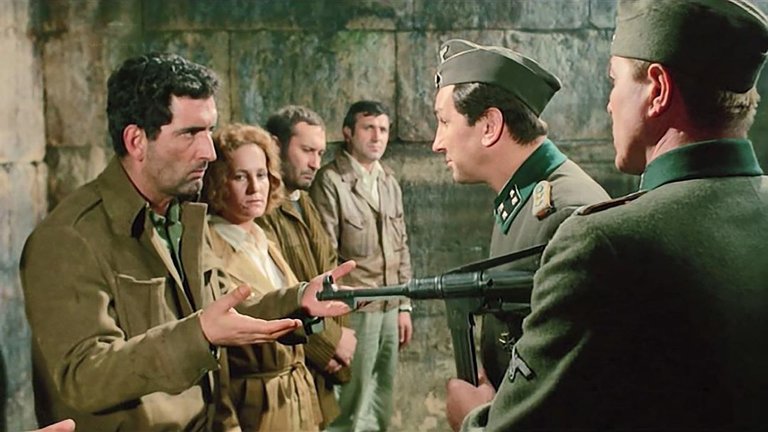
The Partisan film, a genre emblematic of Yugoslav cinema, explored themes of resistance and national identity through diverse directorial lenses. Yet, just as John Ford became synonymous with the American Western or Akira Kurosawa with Japanese jidai-geki, Bosnian director Hajrudin Krvavac emerged as the defining auteur of Yugoslav Partisan cinema. Though his filmography was brief, Krvavac’s works—notably The Bridge (1969)—achieved unprecedented popularity, blending patriotic fervour with crowd-pleasing spectacle. His films eschewed the introspective bleakness of the Yugoslav Black Wave or overt ideological didacticism, instead prioritising kinetic action and Hollywood-inspired storytelling. The Bridge, his second feature, exemplifies this approach, cementing Krvavac’s legacy as a master of the genre.
Set in 1944, as German forces retreat from Greece and prepare to crush a 5,000-strong Partisan force on the Adriatic coast, The Bridge centres on a strategic imperative: destroying a near-indestructible bridge in the Dinaric Mountains to halt Panzer divisions. The mission falls to Major “Tigar” (played by Velimir “Bata” Živojinović), a hardened guerrilla leader who assembles a ragtag team: Zavatoni (played by Boris Dvornik), a sardonic Italian demolitions expert; his protégé “Bambino” (played by Igor Galo); Tihi (played by Boro Begović), a silent knife specialist; and Mane (played by Jovan Janićijević), a smuggler. Their plan hinges on coercing the bridge’s architect (played by Slobodan Perović), who initially resists demolishing his life’s work.
The group’s perilous journey is complicated by Jelena (played by Sibina Mijatović), the sister of a captured resistance fighter, and Sova (played by Relja Bašić), an SS officer claiming defection. Yet Standartenführer Hoffmann (played by Hannjo Hasse), the Nazi commander, anticipates their every move, forcing the Partisans to suspect a traitor in their ranks.
Partisan films were often dismissed by critics as either state-sanctioned propaganda or subversive arthouse experiments (typified by the Yugoslav Black Wave’s existential angst). Krvavac, however, bypassed both extremes, delivering a film that catered unapologetically to mainstream tastes. The Bridge embraced the tropes of Hollywood war films—clear moral binaries, relentless action, and archetypal heroes—while sidestepping overt political messaging. This approach resonated with late-1960s audiences, weary of ideological heavy-handedness but eager for escapism.
While contemporaries like The Battle of Neretva (1969) deployed grandiose budgets and thousands of extras for sprawling battle sequences, Krvavac’s The Bridge adopted a leaner, more focused narrative. Backed by the Yugoslav People’s Army—which provided military equipment and personnel—Krvavac crafted a taut 105-minute thriller. The film’s intimacy contrasts with Neretva’s operatic scale, yet its brisk pacing, pyrotechnic spectacle, and martial arts-inflected combat (a novelty in Yugoslav cinema) ensured mass appeal.
Krvavac and screenwriters Predrag Golubović and Đorđe Lebović distilled the Partisan struggle into a universal war narrative, stripping away ideology to emphasise genre conventions. Influences from Hollywood are unmistakable: The Guns of Navarone (1961) inspired the suicide-mission structure; The Dirty Dozen (1967) informed the team’s motley composition; and Where Eagles Dare (1968) echoed in the plot’s allegiance twists. Even a climactic shootout nods to spaghetti westerns, then at peak popularity.
Though characters are broadly drawn, the cast delivers memorable performances. Relja Bašić shines as the inscrutable Sova, whose motives remain ambiguous until the final act, while Boris Dvornik and Igor Galo inject levity as the doomed mentor-protégé duo. Tragically, Sibina Mijatović—whose career was cut short by a fatal car accident—is underserved by a underwritten role, included seemingly to offset the film’s masculine focus.
Živojinović, a titan of Yugoslav cinema, anchors the film as the stoic Tigar. His transformation into a Rambo-like killing machine in the finale—mowing down German troops single-handedly—stretches credulity but electrifies the narrative. As humorously noted by Serbian filmmaker Igor Stoimenov in the documentary Partisan Film (2009), “Had the Partisans fielded such men, the war might have ended much earlier”.
Though fictionalised, The Bridge draws inspiration from the real-life destruction of Montenegro’s Đurđevića Tara Bridge in 1942. Rebuilt post-war, the bridge later featured in Force 10 from Navarone (1978), a Hollywood sequel that inadvertently paid homage to Krvavac’s vision.
Slovenian composer Bojan Adamič’s score, incorporating the Italian partisan anthem Bella ciao, underscores the film’s emotional beats. The finale’s poignant lament—Germans and Partisans alike mourning the bridge’s destruction—offers a rare concession to anti-war sentiment, acknowledging the human cost beyond national divides.
The Bridge was a domestic box-office triumph and gained international traction, particularly in China. Its success paved the way for Krvavac’s magnum opus, Walter Defends Sarajevo (1972), which refined his formula into the Partisan genre’s zenith. Reuniting Živojinović, Lebović, and composer Adamič, Walter cemented Krvavac’s reputation as a filmmaker who transcended ideological confines to craft enduring populist cinema.
Hajrudin Krvavac’s The Bridge remains a landmark of Yugoslav cinema, marrying patriotic themes with globetrotting genre sensibilities. While snobbish critics may dismiss its simplicity, its enduring appeal lies in its unpretentious commitment to thrills—a testament to Krvavac’s belief that cinema should, above all, entertain.
RATING: 8/10 (+++)
Blog in Croatian https://draxblog.com
Blog in English https://draxreview.wordpress.com/
InLeo blog https://inleo.io/@drax.leo
Hiveonboard: https://hiveonboard.com?ref=drax
InLeo: https://inleo.io/signup?referral=drax.leo
Rising Star game: https://www.risingstargame.com?referrer=drax
1Inch: https://1inch.exchange/#/r/0x83823d8CCB74F828148258BB4457642124b1328e
BTC donations: 1EWxiMiP6iiG9rger3NuUSd6HByaxQWafG
ETH donations: 0xB305F144323b99e6f8b1d66f5D7DE78B498C32A7
BCH donations: qpvxw0jax79lhmvlgcldkzpqanf03r9cjv8y6gtmk9